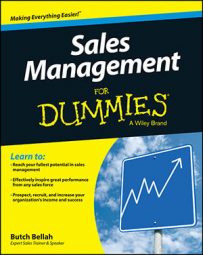Early in your tenure as a new sales manager, it's important to establish and communicate your expectations to each member of your sales organization. Some have their own ideas of where the lines are drawn, a few may be living in the past with your predecessor, and still others may have no preconceived notions and need the direction immediately.
Write your expectations for your team members so each person has a copy and understands what's expected of her. Although this document may not be drastically different from the one in operation with their prior manager, you must put your stamp on it.
You can use the Three P Method:
What are your Performance requirements? Put in writing the required number of calls, new accounts, or any other metric you use to measure performance. Your people must know what criteria you will use to judge them. Don't keep this a secret — they always need to know if they're doing a good job or not.
What are your Participation requirements? Do you require attendance at sales meetings, group meetings, department meetings, or other functions? Will you send team members to trade shows, continuing education, or other opportunities? Make clear what you expect and/or require them to participate in. Don't wait until the last minute to notify them.
What are your Professionalism requirements? Whether or not your company has an official conduct policy, have one for your department. Be specific on how they are to conduct themselves with customers, other associates, and the general public. If you have a dress code or other codes of conduct, get it out in the open now. Professionalism includes integrity, honesty, and attempting each day to satisfy customers.
Being a great sales manager is ultimately about being a great person. If you treat others with respect, lead your team with honesty and integrity, and conduct yourself professionally you'll be miles ahead of the game.
How sales managers listen more than you talk
As a salesperson you're successful in large part because of your ability to listen and honestly hear what your prospects and customers were telling you. As a manager you must put those same skills to use in dealing with your sales team. Early on you're going to want to solve all the world's problems overnight. While that's a worthy goal, it will sometimes cause you to make knee-jerk reactions and poor decisions.
Be quick to listen, slow to speak, and ensure you understand the entire situation before making a decision. You've heard your entire life that there are two sides to every story, and in some cases there are three and four sides. You just have to make sure you have all the information available at your disposal.
Sometimes you must make a quick decision. Someone has to make a call and you're the manager so it falls to you to decide how to proceed. In those cases, consider the following questions:
What's best for the customer? If every decision you make is customer-centered, you'll win far more than you'll lose. Are there times you have to go against this? Sure, there are no hard-and-fast rules, but keeping the customer first makes you a better manager and your company a better provider.
What's best for the employee? A close second to your customers are your employees or associates. Be very conscious of decisions and how they impact them and their lives. Be very aware of how decisions affect their income or potential for income.
The company's need to make a profit. Is there a reason this point is last in the list? If you keep the first two questions in the proper order this question takes care of itself.
But, when all else fails, and you must make a decision simply do the best you can with what you have to work with.
How to be a consistent sales manager
Nothing costs you credibility with your sales team more than inconsistency — inconsistency in your decision making, communication, or administration. If you want to drive your salespeople crazy, have an "idea of the week" mentality where you get all fired up and change everything only to lose interest in it, stop measuring it, and change the focus the next week.
Good salespeople want consistency. After you establish your ground rules and operating procedures, don't deviate from them. And, before you go trotting out a new program, check it, double-check it, and triple-check it. You never lose credibility for yourself or the company faster than rolling out a program that hasn't been well thought out.
How sales managers set the bar high, but not too high
Your first instinct when you take over the department is to raise everyone's quota 50 percent (okay, so that may be a slight exaggeration). Again, take your time. Be careful not to set the bar too high in the beginning. As you establish yourself, you want to be seen as someone who asks and helps your team stretch, but is also in tune with the market enough to be realistic.
Just as you can set the bar too high on quotas, you can do the same with your time. Understand going into the job that everything is going to take twice as long as you think it is — that's just how it works. It's extremely easy to overcommit and get yourself into sticky situations you could have avoided if you had just slowed down a bit.
If you finish something prior to deadline, nobody is going to complain, but if you miss a few deadlines early in the job or end up burning yourself out because you overcommitted, you'll know it and feel it.

